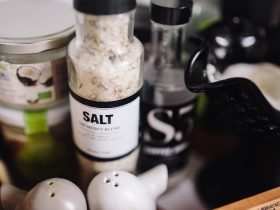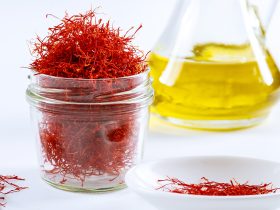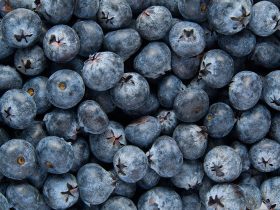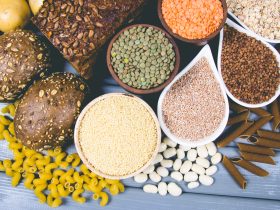While no single food can guarantee protection against cancer, a balanced combination of foods can play a vital role. Aim for a meal plan that consists of at least two-thirds plant-based foods and no more than one-third animal protein.
This dietary strategy, known as the “New American Plate,” is recognized by the American Institute for Cancer Research as a potent tool in the fight against cancer. To better understand how to build your plate, let’s explore examples of better and worse choices.
- Folate Foods
Naturally occurring folate is a crucial B vitamin that may serve as a protective shield against colorectal, rectal, and breast cancers.
A breakfast table can serve as a robust source of this essential nutrient, with fortified breakfast cereals and whole wheat products being excellent folate providers. Additionally, orange juice, melons, and strawberries boast ample amounts of folate.
Asparagus and eggs are also noteworthy sources of folate, as are beans, sunflower seeds, and leafy green vegetables like spinach or romaine lettuce.
While obtaining folate from a pill may seem convenient, the best way to ensure adequate intake is through a balanced diet rich in fruits, vegetables, and enriched grain products.
However, women who are pregnant or planning to become pregnant should consider taking a folic acid supplement. This ensures they receive sufficient amounts of folate, which is instrumental in preventing certain birth defects.
Learn more about the top folic acid foods and include them in your diet.
- Add Grapes to Your Diet
Grapes and their derivatives, particularly purple and red grapes, are rich in resveratrol, a compound renowned for its potent antioxidant and anti-inflammatory properties. In laboratory settings, resveratrol has demonstrated the capacity to thwart the cellular damage that often serves as a precursor to the onset of cancer.
However, current evidence does not suffice to conclude that consuming grapes, grape juice, or wine, or taking supplements thereof, is effective in preventing or treating cancer.
- Eat More Tomatoes
While the exact reason is not entirely clear, it’s possible that the lycopene – the pigment responsible for the red hue of tomatoes – or another compound in tomatoes may be responsible for their cancer-fighting properties.
Several studies have linked tomato consumption with a lower risk of various cancers, notably prostate cancer. Processed tomato products like juice, sauce, or paste have also been shown to amplify the cancer-fighting potential of tomatoes.
- Colorful Fruits and Vegetables
Colorful fruits and vegetables are abundant in cancer-fighting nutrients. The more colorful these foods are, the greater the amount of these nutrients they possess.
By consuming these foods, you can not only bolster your body’s defenses against cancer, but also support weight management.
Being overweight or obese heightens the risk of developing various cancers, including those of the colon, esophagus, and kidneys. Aim for foods that strengthen the immune system such as vegetables, with an emphasis on dark green, red, and orange varieties.
- Eat Berries
Strawberries and raspberries contain a phytochemical called ellagic acid, a powerful antioxidant that may combat cancer by deactivating certain cancer-causing substances and slowing the growth of cancer cells.
Still, there isn’t enough evidence to confirm its effectiveness in fighting cancer in humans. Incorporating strawberries and raspberries into a balanced diet is beneficial due to their overall nutritional value and potential antioxidant benefits, but they should not be relied on solely as a cancer-fighting strategy.
Similarly, blueberries are also rich in potent antioxidants that may support health, including potential benefits against cancer.
Antioxidants work by neutralizing free radicals, which are harmful molecules that can damage cells and contribute to various diseases, including cancer. Incorporating blueberries into your diet can be beneficial for overall health, but more research is needed to fully understand their impact on cancer prevention and treatment.
You can easily include blueberries in your diet by adding them to oatmeal, cereal, yogurt, or salads to boost your intake of these healthful berries.
- Include Curcumin in Your Diet
Curcumin, found in turmeric, has shown promise in laboratory studies as a potential cancer fighter due to its ability to suppress the transformation, proliferation, and invasion of cancerous cells.
However, further research in humans is needed to understand its effectiveness in preventing cancer. It is recommended to include turmeric in your diet as a part of a balanced and varied diet, but not solely as a cancer prevention strategy.
Always consult with a healthcare professional before making significant changes to your diet or lifestyle.
- Drink More Water
Water does more than just quench your thirst – it may also provide protection against bladder cancer. This is due to water diluting concentrations of potential cancer-causing agents in the bladder.
Additionally, drinking ample fluids results in more frequent urination, which minimizes the amount of time these agents remain in contact with the bladder lining.
- Give Up Processed Meat
Indulging in an occasional Reuben sandwich or hot dog at a game or gathering is unlikely to have a significant impact on your health.
However, reducing your consumption of processed meats like bologna, ham, and hot dogs can significantly reduce your risk of developing colorectal and stomach cancers.
This is because meats that have undergone smoking or salt preservation contain chemicals that could potentially increase the likelihood of cancer.
- Get Your Vitamins From Food
Although certain vitamins may offer protection against cancer, it’s important to obtain these nutrients naturally from food rather than relying on supplements.
Both the American Cancer Society and the American Institute for Cancer Research emphasize that consuming cancer-fighting nutrients through foods like nuts, fruits, and green leafy vegetables is much more effective than taking supplements.
It’s essential to maintain a healthy, balanced diet in order to obtain these nutrients and reap their benefits.
- Eat Beans
Beans are highly nutritious and contain a variety of potent phytochemicals, which might aid in the prevention of cancer by shielding the body’s cells against damage that could contribute to cancer development.
In laboratory settings, these substances were observed to inhibit tumor growth and prevent tumors from releasing substances that might harm neighboring cells.
- Sip Some Green Tea
While the evidence is not yet definitive, tea – particularly green tea – is increasingly being recognized for its potential as a potent cancer-fighting agent.
Laboratory studies have shown that green tea can inhibit or halt the progression of cancer cells in organs like the colon, liver, breast, and prostate. This beneficial effect has also been observed in lung tissue and skin cells.
Additionally, in certain longer-term studies, tea consumption has been linked to a lower incidence of cancers affecting the bladder, stomach, and pancreas. Nonetheless, further research involving human subjects is necessary before tea can be officially endorsed as a cancer-fighting remedy.
- Choose Dark Leafy Greens
Adding dark green leafy vegetables to your diet offers a multitude of health benefits due to their high content of various nutrients.
Fiber, which is found in abundance in these vegetables, is known for its role in digestive health and aiding in maintaining healthy body weight. Folate, another essential nutrient present in dark green leafy vegetables, is crucial for cell division and the production of DNA, making it an important nutrient for overall health.
Additionally, carotenoids, such as beta-carotene, lutein, and zeaxanthin, present in these vegetables, have antioxidant properties and are linked to reduced risk of certain types of cancer, including those affecting the mouth, larynx, pancreas, lung, skin, and stomach.
Incorporating a variety of dark green leafy vegetables into your diet, whether in salads, soups, or cooked dishes, can contribute to a healthy lifestyle and may help in preventing certain types of cancer.
- Consume Less Alcohol
Alcohol consumption has been associated with several types of cancer, including cancers of the mouth, throat, larynx, esophagus, liver, and breast. Additionally, it might elevate the risk for colon and rectal cancer. Therefore, the American Cancer Society advises against alcohol consumption.
If you choose to drink alcohol, it is recommended to limit intake to no more than two drinks per day for men and one drink per day for women.
Women who have a higher risk of breast cancer should consult with a doctor to determine a safe amount of alcohol based on their individual risk factors.
- Add Cruciferous Vegetables to Your Diet
Cruciferous vegetables, such as broccoli, cauliflower, cabbage, Brussels sprouts, bok choy, and kale, are versatile and nutritious options that can elevate the flavor profile of various dishes.
Beyond culinary appeal, these vegetables contain compounds that may assist the body in combating certain cancers, including colon, breast, lung, and cervix cancers.
Although laboratory research has shown promise, the results of human studies have been less consistent.
- Give Up Sugar
While sugar itself may not directly cause cancer, it is important to limit its intake as it can lead to an unhealthy diet that is low in nutrient-rich foods, which are important for protecting against cancer.
Consuming too much sugar can also contribute to weight gain and obesity, both of which are known cancer risk factors. As an alternative to sugary snacks, incorporating fruits into your diet is a great way to satisfy your sweet cravings while getting essential vitamins and minerals.
Remember to enjoy sweet treats like cookies, candies, and pastries in moderation, opting for whole fruits whenever possible.
















Find Us on Socials